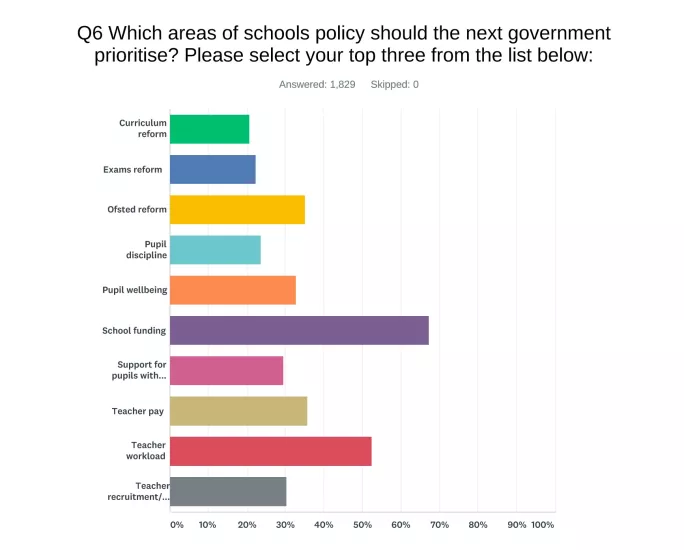- Home
- New government must fix school funding, say teachers
New government must fix school funding, say teachers

The next government should make improving school funding a key part of its education strategy, teachers have told Tes.
Two-thirds of teachers responding to a Tes election campaign final week survey listed “school funding” as one of their three top priorities for ministers, while just over half said there should be a focus on teacher workload.
Of the 1,829 teachers who responded to the question: “Which areas of schools policy should the next government prioritise?”, 1,233 (67 per cent) selected “school funding” as one of their three preferences. The next most popular policy area was “teacher workload” (52 per cent), followed by “teacher pay” (36 per cent).
Exclusive: Labour is only party to woo more teachers
Analysis: Election school funding pledges unspun
Watch: Head’s dilemma - Cut 20 TAs vs a 4.5-day week?
A significant proportion of teachers also prioritised Ofsted reform (35 per cent), pupil wellbeing (33 per cent), and teacher recruitment and retention (30 per cent).
Geoff Barton, general secretary of the Association of School and College Leaders, said: “It correlates with what school leaders say to me - funding is the number one issue.
“Irrespective of the government’s promises of £7 billion, teachers are fully aware of the funding shortage and how it has impacted on vulnerable children relying on teaching assistants.”
Election 2019: What are teachers’ priorities?

Mr Barton added: “Our members tell me the biggest issue is workload in terms of retention. As a reason for teachers leaving early, number two is pay and number one is workload.
“Teachers have been incredibly accomplished and dutiful in implementing a swathe of reforms, and now they are saying, ‘How has this improved the lives of children and young people?’ They may not want more of the same, which is why they might be contemplating a change in government.”
On the issue of teacher pay, he said: “Given the volume of teachers we are going to need, and given that too many graduates assume the profession will be too much work, they have to increase pay.”
Mr Barton also said there had been a “lack of detail” regarding the Conservative government’s plans to raise teachers’ starting salaries to £30,000, and that while it could attract new people into the profession, it could potentially “shift a sense of disgruntlement to people who have been teaching for three years, if their salaries do not go up, too” and increase the rate of attrition.
“Ultimately we lose 52 per cent of the profession after 10 years, and parents want the most experienced teachers for their children,” Mr Barton said.
“We need to move beyond the gimmickry of announcements and make the profession one where people can work reasonably, be paid fairly and have time for their families.”
Mary Bousted, joint general secretary of the NEU teaching union, said: “First of all, it seems to me very predictable that teachers would focus on funding, workload and pay as those are the three things that have come up with our members as key issues. Until the government does something about those three things, we will continue to see people leaving the profession early on.
“Teachers work the longest unpaid overtime of any profession, in buildings falling down around them. Once you’ve got a third of a profession leaving within five years, you then have to ask, ‘What is driving them away?’ That retention is going to get worse and worse.”
School funding, or lack of it, was identified as a liability at the 2017 general election, after which a survey found that 750,000 voters switched their votes as a result of school funding policy.
This year, all three major parties - the Conservatives, Labour and Lib Dems - have promised to invest heavily in schools. However, analysis from the respected Institute for Fiscal Studies (IFS) has since cast doubt over the true value of their pledges.
It found that Labour’s promise of an extra £10.5 billion for schools over the next three years only amounts to £7.5 billion when inflation is taken into account, while the Lib Dems’ pledge of £9.1 billion by 2022-23 amounts to just £5.6 billion in real terms.
However, both pledges are worth more than the Conservatives’ promise of an extra £7.1 billion, which amounts to £4.3 billion in real terms between next year and 2022-23.
The poll also shows that Labour has been the only party to persuade more teachers to switch their allegiance during the general election campaign.
Keep reading for just £1 per month
You've reached your limit of free articles this month. Subscribe for £1 per month for three months and get:
- Unlimited access to all Tes magazine content
- Exclusive subscriber-only stories
- Award-winning email newsletters



